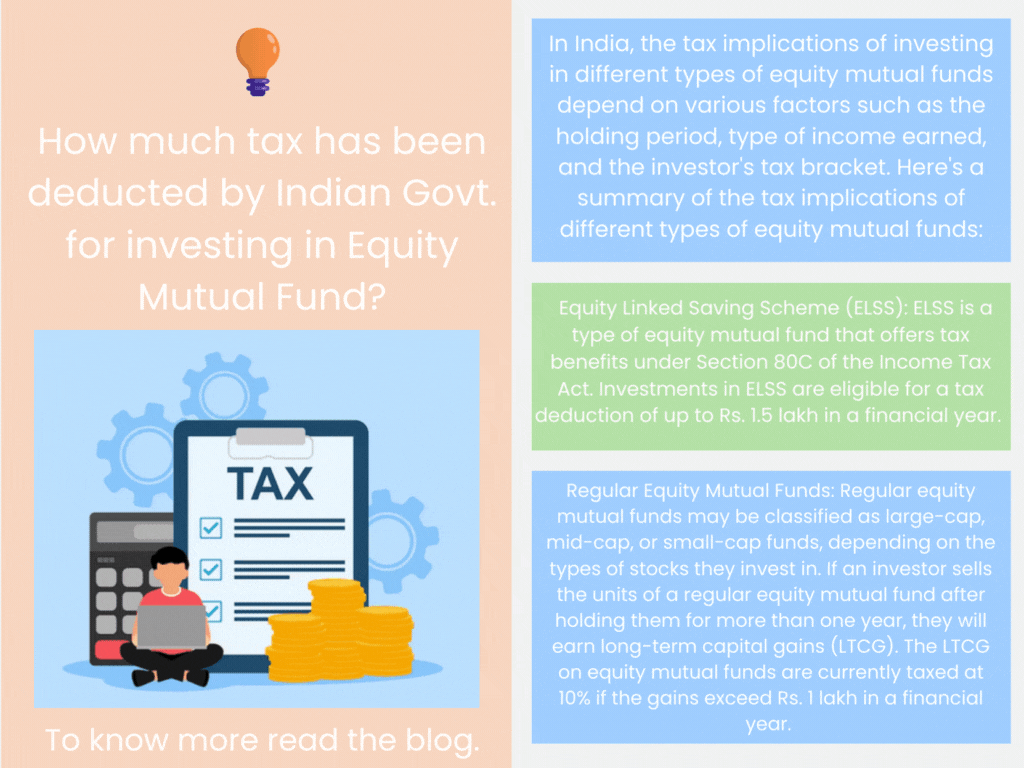How much tax has been deducted by Indian Govt. for investing in Equity Mutual Fund?
In India, the tax implications of investing in different types of equity mutual funds depend on various factors such as the holding period, type of income earned, and the investor's tax bracket. Here's a summary of the tax implications of different types of equity mutual funds:
Equity Linked Saving Scheme (ELSS): ELSS is a type of equity mutual fund that offers tax benefits under Section 80C of the Income Tax Act. Investments in ELSS are eligible for a tax deduction of up to Rs. 1.5 lakh in a financial year. ELSS has a lock-in period of three years, and any gains earned on the investment after three years are tax-free. However, if an investor sells the units of an ELSS before the completion of the lock-in period, the gains earned will be taxed as short-term capital gains (STCG) at a rate of 15%.
Regular Equity Mutual Funds: Regular equity mutual funds may be classified as large-cap, mid-cap, or small-cap funds, depending on the types of stocks they invest in. If an investor sells the units of a regular equity mutual fund after holding them for more than one year, they will earn long-term capital gains (LTCG). The LTCG on equity mutual funds are currently taxed at 10% if the gains exceed Rs. 1 lakh in a financial year. However, these gains are exempt from tax up to Rs. 1 lakh in a financial year. If an investor sells the units of a regular equity mutual fund before holding them for one year, they will earn short-term capital gains (STCG) that are taxed at 15%.
Index Funds: Index funds are mutual funds that invest in stocks of a particular index such as the Nifty 50 or the Sensex. The tax implications of investing in index funds are the same as those for regular equity mutual funds.
Exchange Traded Funds (ETFs): ETFs are similar to index funds, but they are listed on stock exchanges and can be bought and sold like stocks. The tax implications of investing in ETFs are the same as those for regular equity mutual funds.
Dividend Income: If an investor earns dividend income from an equity mutual fund, the mutual fund deducts a dividend distribution tax (DDT) before distributing the dividend to the investor. As per the current tax laws, the DDT rate for individuals is 10%, and no additional tax is deducted.
Long-term Capital Gains (LTCG): If an investor sells the units of an equity mutual fund after holding them for more than one year, they will earn LTCG. The LTCG on equity mutual funds are currently taxed at 10% if the gains exceed Rs. 1 lakh in a financial year. However, these gains are exempt from tax up to Rs. 1 lakh in a financial year. No TDS is deducted on LTCG on equity mutual funds.
Short-term Capital Gains (STCG): If an investor sells the units of an equity mutual fund before holding them for one year, they will earn STCG. STCG on equity mutual funds are currently taxed at 15%, and the mutual fund deducts this tax at source before paying the redemption proceeds to the investor.
It's important to note that in the Union Budget 2021, the government introduced a new provision that makes gains from the sale of equity mutual fund units taxable at the time of redemption, instead of sale. This means that if you sell your equity mutual fund units after April 1, 2021, you will have to pay tax on the gains at the time of redemption, and not at the time of sale. The taxation rules for mutual funds may be subject to change from time to time, so it's important to consult with a tax expert or financial advisor for the latest information.


